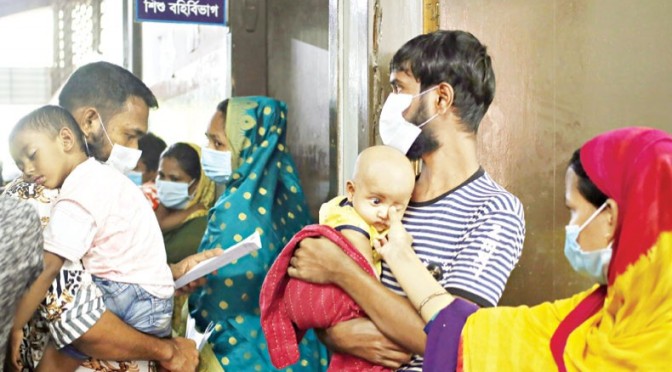Acute supply shortages are denying children access to life-saving vaccines listed in the Expanded Programme on Immunisation in different parts of Bangladesh amid allegations of the delayed release of funds by the Bangladesh government.
Parents in districts such as Rangpur, Dinajpur, Bhola, Jashore, and Barishal alleged that their children were denied vaccines in designated vaccination centres in the past three months.
The government supplies all five vaccines free of charge under EPI for children aged below one year to prevent 11 life-threatening diseases.
The vaccines include pentavalent, which protects a child from diphtheria, whooping cough, tetanus, hepatitis B, and hemophilus influenza type B; BCG, which gives protection against tuberculosis, PCV against pneumonia, OPV against poliomyelitis, and MR against measles.
The government administers 14 doses of these vaccines in five sessions per year in its designated vaccination centres across the country.
Experts said that the vaccine might not give the expected protection if not administered on time.
Professor Sharmeen Ahmed, chairman of the microbiology and immunology department at Bangabandhu Sheikh Mujib Medical University, said that timely administrating of the vaccine ensures its best performance.
Mohammed Nizam Uddin, line director of the Directorate General of Health Services for Maternal Neonatal Child and Adolescent Health, said that they provided vaccine requisitions as per the rules in December but had yet to get the required number of vaccines, leading to some disruptions in the immunisation programme.
The government collects the vaccines through UNICEF in co-financing with Gavi, the Vaccine Alliance. UNICEF sources the vaccine from producers in Europe and India and supplies it to children.
Nizam said that UNICEF failed to give them the vaccine on time.
‘It is not related to the dollar crisis or unrest in the Middle East. Vaccine shipments are held by air,’ he said, adding that the government has paid UNICEF for the vaccines already.
UNICEF officials said that they used to procure vaccines for 109 countries in the world, just as they do for Bangladesh.
‘The government did not release funds for vaccines on time, which resulted in a supply problem,’ said Riad Mahmud, UNICEF’s health specialist (immunisation).
He said that the government’s fund-releasing process is complex and takes a long time.
He suggested the government make the fund release process easy, considering it a purchase of life-saving item.
The government lastly released funds for vaccine purchases in December and all the vaccines were expected to reach the country by April, officials said.
Israt Jahan, a resident of Purba Khashbag under Rangpur municipality, told New Age Rangpur correspondent that she went to the local immunisation centre and returned without vaccinating her baby born on December 1.
According to the module, a child is required to be vaccinated within 45 days of birth, but her baby was not vaccinated even after 65 days.
Sharmeen Akter, Tazhat Union sub-health complex officer, said that they had not received an adequate supply of vaccines in the past three months.
‘If there is no supply of vaccine, I cannot help but say sorry to people and request that they come back on another day,’ she said.
Md Wazed Ali, the civil surgeon of Rangpur, told New Age on Thursday that they had been given inadequate vaccines for a long time and that there had been no supply at all in the past three weeks.
Md. Nayeem Hassan, upazila health and family planning officer at Birampur Upazila Health Complex in Dinajpur, said that those who were missing one or two doses of vaccines because of supply shortages were administered at a later day when they became available.
Niropam Sarkar Shohag, upazila health and family planning officer at Burhanuddin in Bhola, said that he had not gotten any pentavalent vaccines in the past three months, and other vaccines were also short in supply.
Bhola civil surgeon KM Shafiquzzaman acknowledged the shortage of pentavalent, IPV, and BCG vaccines in the district.
EPI programme manager SM Abdullah Al Murad said that Bangladesh needs vaccines for nearly four million children annually.
He said that they had already received some vaccines, and those would be distributed by February 15.
In the financial year 2023–24, Bangladesh estimated Tk 790 crore for vaccines, with the government contributing Tk 440 crore and the rest contributed by Gavi, Murad said.
DGHS line director Nizam Uddin said that they received a demand note from UNICEF in June but had to wait until December to release the funds due to a bureaucratic tangle.
‘We have to pay in advance for vaccines, which is a complex process and takes additional time,’ he said, adding that earlier they used to cover up supply gaps from their stock, but this year the buffer stock was low, leading to the crisis.
Published on New Age
